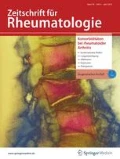Zusammenfassung
Die rheumatoide Arthritis (RA) ist eine rheumatische Erkrankung, deren Auslöser und Verlaufsfaktoren noch weitgehend unbekannt sind. Durch intensive Forschung ist bisher bekannt, dass verschiedene Faktoren an der Entstehung einer entzündlichen Rheumaerkrankung mitbeteiligt sind. Neben genetischen Faktoren spielen Umweltfaktoren, zu denen auch Stress zählt, bei der Auslösung und im Verlauf von rheumatologischen Erkrankungen eine entscheidende Rolle. Studien kann man entnehmen, dass psychologischer Stress die Krankheitsaktivität der RA beeinflussen kann. Chronischer leichter und moderater Stress (z. B. Familienstress oder Arbeitsstress) kann die Krankheitsaktivität steigern, außerdem korreliert Stress am Anfang der Erkrankung mit schnellerer radiologischer Progredienz. Hinzu kommt, dass eine Assoziation zwischen chronischem und moderatem Arbeitsstress und dem Ausbruch der RA festgestellt wurde. Zur Prävention der stressbezogenen Risiken könnte man effektive Coping-Strategien mit aktivem Problemlösen, kognitive Umstrukturierung und soziale Unterstützung und Entspannungstechniken benutzen. Zu einem besseren Verständnis brauchen wir jedoch weitere klinische und experimentelle Untersuchungen der Stresswirkungen bei RA.
Abstract
Rheumatoid arthritis (RA) is a chronic rheumatic disease of unknown aetiology and variable severity. It is now well known that several risk factors are involved in its pathogenesis, including genetic factors and sex hormones as well as environmental factors, i.e. infections and stress. In particular stress is now recognised as an important risk factor for the onset and even more for the modulation of disease activity in RA. Many studies have clearly shown that chronic mild stress (family or professional stress) may lead to proinflammatory effects, increasing disease activity. Furthermore, a positive correlation between the stress level at the onset of RA and radiological progression could be demonstrated. The onset of RA was associated with moderate stress at work, underlining the possible interactions between the various stress systems and the immune system. In this respect it could be demonstrated that coping strategies reduce stress episodes and change stress management with a positive impact on disease activity in RA. However, more studies are warranted to further explore the pathophysiological implications of stress on onset and activity of chronic autoimmune diseases.

Literatur
Baerwald CG, Mok CC, Tickly M et al (2000) Corticotropin releasing hormone (CRH) promoter polymorphisms in various ethnic groups of patients with rheumatoid arthritis. Z Rheumatol 59:29–34
Bengtsson C, Theorell T, Klareskog L et al (2009) Psychosocial stress at work and the risk of developing rheumatoid arthritis: results from the Swedish EIRA study. Psychother Psychosom 78:193–194
Bosch PR, Traustadóttir T, Howard P et al (2009) Functional and physiological effects of yoga in women with rheumatoid arthritis: a pilot study. Altern Ther Health Med 15:24–31
Bricou O, Taïeb O, Baubet T et al (2006) Stress and coping strategies in systemic lupus erythematosus: a review. Neuroimmunomodulation 13:283–293
Bugajska J, Brzosko M, Jedryka-Góral A et al (2010) Psychological stress in rheumatoid arthritis patients: a comparative Polish-German study: summary of the current conceptualization of the role of stress in rheumatoid arthritis. Autoimmun Rev 9:211–215
Cutolo M, Straub RH (2006) Stress as a risk factor in the pathogenesis of rheumatoid arthritis. Neuroimmunomodulation 13:277–282
Davis MC, Zautra AJ, Younger J et al (2008) Chronic stress and regulation of cellular markers of inflammation in rheumatoid arthritis: implications for fatigue. Brain Behav Immun 22:24–32
Demange V, Guillemin F, Baumann M et al (2004) Are there more than cross-sectional relationships of social support and support networks with functional limitations and psychological distress in early rheumatoid arthritis? The European Research on Incapacitating Diseases and Social Support Longitudinal Study. Arthritis Rheum 51:782–791
Dube SR, Fairweather D, Pearson WS et al (2009) Cumulative childhood stress and autoimmune diseases in adults. Psychosom Med 71:243–250
Elenkov IJ, Chrousos GP (2006) Stress system – organization, physiology and immunoregulation. Neuroimmunomodulation 13:257–267
Fitzgerald PJ (2009) Is elevated noradrenaline an aetiological factor in a number of diseases? Auton Autacoid Pharmacol 29:143–156
Herrmann M, Schölmerich J, Straub RH (2000) Stress and rheumatic diseases. Rheum Dis Clin North Am 26:737–763
Katz PP (2005) Use of self-management behaviors to cope with rheumatoid arthritis stressors. Arthritis Rheum 53:939–949
Li J, Schiøttz-Christensen B, Olsen J (2005) Psychological stress and rheumatoid arthritis in parents after death of a child: a national follow-up study. Scand J Rheumatol 34:448–450
Malysheva O, Pierer M, Wagner U et al (2008) Association between beta2 adrenergic receptor polymorphisms and rheumatoid arthritis in conjunction with human leukocyte antigen (HLA)-DRB1 shared epitope. Ann Rheum Dis 67:1759–1764
Pradhan EK, Baumgarten M, Langenberg P et al (2007) Effect of mindfulness-based stress reduction in rheumatoid arthritis patients. Arthritis Rheum 57:1134–1142
Pradhan EK, Baumgarten M, Langenberg P et al (2007) Effect of mindfulness-based stress reduction in rheumatoid arthritis patients. Arthritis Rheum 57:1134–1142
Schanberg LE, Gil KM, Anthony KK et al (2005) Pain, stiffness and fatigue in juvenile polyarticular arthritis: contemporaneous stressful events and mood as predictors. Arthritis Rheum 52:1196–1204
Shih M, Hootman JM, Strine TW et al (2006) Serious psychological distress in U.S. adults with arthritis. J Gen Intern Med 21:1160–1166
Straub RH, Dhabhar FS, Bijlsma JW et al (2005) How psychological stress via hormones and nerve fibers may exacerbate rheumatoid arthritis. Arthritis Rheum 52:16–26
Wagner U, Wahle M, Moritz F et al (2006) Promoter polymorphisms regulating corticotrophin-releasing hormone transcription in vitro. Horm Metab Res 38:69–75
Wahle M, Hanefeld G, Brunn S et al (2006) Failure of catecholamines to shift T-cell cytokine responses toward a Th2 profile in patients with rheumatoid arthritis. Arthritis Res Ther 8:R138
Wahle M, Neumann RP, Moritz F et al (2005) Beta2-adrenergic receptors mediate the differential effects of catecholamines on cytokine production of PBMC. J Interferon Cytokine Res 25:384–394
Interessenkonflikt
Die korrespondierende Autorin gibt an, dass kein Interessenkonflikt besteht.
Author information
Authors and Affiliations
Corresponding author
Rights and permissions
About this article
Cite this article
Malysheva, O., Pierer, M., Wagner, U. et al. Stress und Rheuma. Z. Rheumatol. 69, 539–543 (2010). https://doi.org/10.1007/s00393-010-0662-9
Published:
Issue Date:
DOI: https://doi.org/10.1007/s00393-010-0662-9

